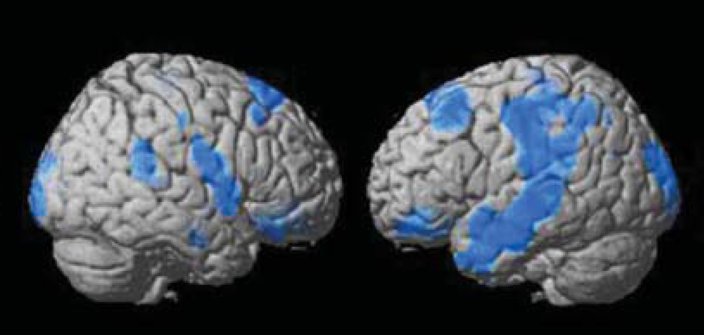Los Angeles — Leading psychiatrist Daniel G. Amen, M.D., founder of the eight specialized Amen Clinics around the country, has released a new study March 20 that shows brain SPECT (single photon emission computed tomography) imaging that measures blood flow and activity patterns identifies who is likely to get better from depression and who is not. It was published in the Journal of Alzheimer’s Disease because depression is a highly treatable risk for cognitive decline and Alzheimer’s disease.
The researchers compared the SPECT scans of 507 depressed patients who responded to treatment to the scans of 106 patients who were considered nonresponders. The study found that patients who did not respond to treatment had lower overall cerebral blood flow, especially in the frontal, temporal, and parietal lobes and in brain regions known to be affected by Alzheimer’s, including the right hippocampus and left precuneus.

Figure Caption: A statistical parametric map demonstrated brain regions that are abnormally lower in regional cerebral blood flow in treatment-resistant depression (blue shaded areas) compared to persons who do respond to treatment. These include the frontal, temporal and parietal lobes.
“This is a critically important study,” shares Amen, the ten-time New York Times bestselling author and double board-certified psychiatrist. “Knowing who is likely to get better from depression and who is not, will help treating physicians be sensitive to which patients are likely to need more help and need to be monitored more closely.” Treatment-resistant depression is a major risk factor for suicide, divorce and job loss. Dr. Amen also says, “This finding will also lead to more personalized treatment. For patients with low brain activity, stimulating the brain will be more important than standard serotonin-enhancing drugs that tend to lower brain activity.”
Amen Clinics, Inc. is one of the world leaders in applying brain imaging science to help people who struggle with emotional issues, behavioral challenges, cognitive problems and learning challenges.
For more information on Daniel Amen, MD and the Amen Clinics, go to www.amenclinics.com or contact Natalie Buchoz at nbuchoz@amenclinics.com.
###
Daniel G. Amen, M.D. is the founder of Amen Clinics in Costa Mesa, Encino and Walnut Creek, Calif., Bellevue, Wash., Reston, Va. (D.C. area), Atlanta, Chicago and New York. He is also a double board-certified psychiatrist, neuroscientist, professor, and one of the world’s foremost experts on using brain-imaging technology to help optimize and treat his patients. His research was listed as one of the Top 100 Stories in Science for 2015 by Discover magazine. He is a 10-time New York Times best-selling author and has hosted 12 highly popular shows about the brain for public television. His work has been featured in The New York Times Magazine, The Washington Post, Men’s Health, The “Dr. Oz Show,” “Dr. Phil” and many others. His latest books are Memory Rescue and Change Your Brain, Change Your Life.
The Journal of Alzheimer’s Disease (JAD) is an international multidisciplinary journal to facilitate progress in understanding the etiology, pathogenesis, epidemiology, genetics, behavior, treatment and psychology of Alzheimer’s disease. The journal publishes research reports, reviews, short communications, book reviews and letters-to-the-editor. Groundbreaking research that has appeared in the journal includes novel therapeutic targets, mechanisms of disease and clinical trial outcomes. The Journal of Alzheimer’s Disease has an Impact Factor of 3.731 according to the 2016 Journal Citation Reports® (Clarivate Analytics, 2017). www.j-alz.com.
Website | www.amenclinics.com Twitter | @DocAmen
